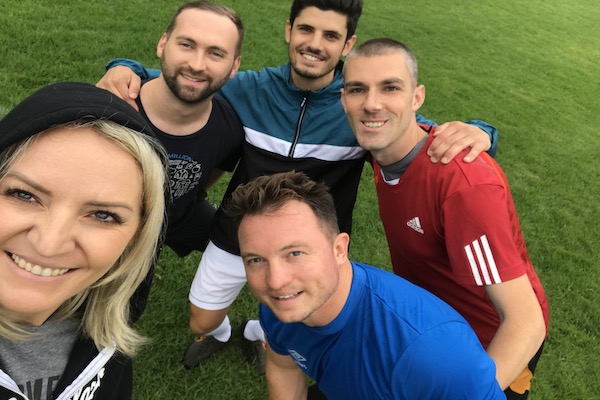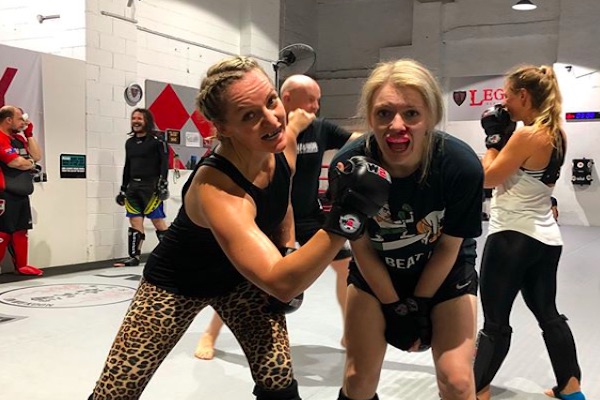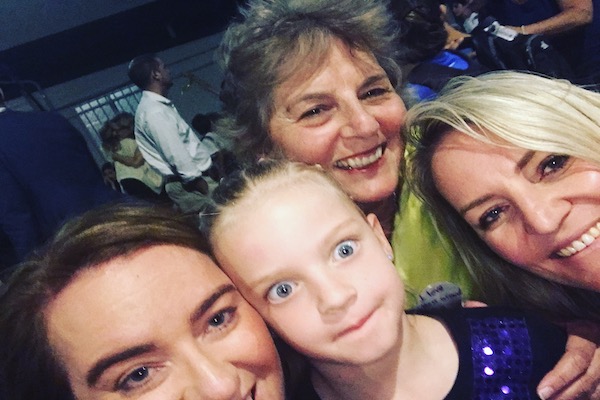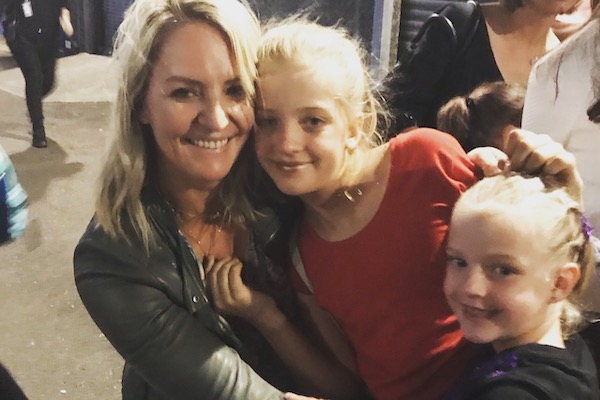
Get your FREE 30-day trial.
Start by selecting a product:
Jo Gaines has been smashing stereotypes her entire career. From a teen “all-star” employee at KFC to a mum of two and AVP of Sales at Salesforce, her unwavering determination to be a role model for others has been her north star.
My mother worked three jobs to make ends meet, and always said that women can do anything that men can do – there is no difference. She was always breaking down walls and glass ceilings. She definitely instilled the characteristics of being strong, dependable and solid in me, so from a young age, I fiercely wanted my independence. At the age of 12, I started working at my aunt's cafe to earn pocket money and at 14 I started working at KFC.
I really appreciated the independence of working at KFC — of getting myself there and home, and having my own money. I had a lot of things going on when I was a teenager — I was bullied at school, my stepfather died when I was 17, and I often felt like the universe was kicking me over and over to see how much I could take. I kept having to pick myself up and say, “you know you can do this”. This dogged determination has not faltered my entire life.
I took my job quite seriously and became a KFC All-Star, which meant that I could cook, clean and serve. It was pretty rare. It was also a stereotype at the time that women should work up at the front, serving, and the men should work at the back cooking and cleaning. I did it all.
I worked at KFC all through high school, and when I left I received quite possibly the best reference of my career. This experience was my starting point in business – it’s where I really built the business acumen and dedication that has become a core value for my professional and personal lives, and helped build my confidence and cemented my desire to be successful.

I was 20 and landed a job as a sales coordinator working for a magazine company, Attic Futura, which would eventually become Pacific Publications. I thought I wanted to be a journalist, and that moving into magazines was a path to that. But like a lot of others I meet, I stumbled into sales and fell in love with it.
I was in a sales support role at the time barely making ends meet, earning $16k a year and working ridiculous hours — really grinding trying to survive. But it was my first taste of being around people selling and I thought, as usual, 'I can do this'!
In three years, I worked my way up to National Advertising Manager, with my own team. I had great managers there who really believed in me and helped me build the confidence I needed to be successful.
As a result of my never-ending love affair with music, I spent years working in sales for music magazines including Rolling Stone and Juice, and in 1999 at Juice I helped build a website for them. I became fascinated with the internet.

Yes, after Juice, I worked for one of the first digital ad networks in Australia and, while I had some challenging experiences, it helped get me to where I am today. It was a startup and there were months that we didn't get paid correctly, if at all, and we went through three rounds of redundancies, but I stuck with it because it was a great learning experience and the team was pretty special. I got to do some really amazing things, like attending the 2000 Olympic Games in Sydney as a VIP.
I joined Yahoo in 2004, which was doing incredible things at the time – a big tech company that was growing quickly and changing the world. I was the National Sales Director and managed an incredible team. I really discovered my passion for helping people succeed in their careers.
I’m my best self when I have a leader that believes in people, and when I can be a leader with that belief in my team. I have that here at Salesforce – I can do great things and thrive if there is that belief.
I worked for a few more big media companies before I got my first taste of true general management, running sales, marketing, admin, subscriptions, PR and editorial teams – I've really thrived when I can really blaze trails, uncovering new territories and products that transform an industry.
Moving back into startups, I found myself in the most challenging leadership role I've ever experienced. The company went into voluntary administration, the C-level execs all left and it was up to me and the head of engineering to run the company. We had to find a buyer for the business, encourage people to stay and create an environment where they felt like they were a part of something good. I'm proud to say that we accomplished this – some of the superstars from there then worked with me at Krux and now work with me at Salesforce.
When I moved to Krux in 2014, I was the first employee in Australia — I set up my office in my lounge room! At this time, everyone was saying data-driven advertising was too hard, that it wouldn't stick. Then, lo and behold, we were acquired by Salesforce in November 2016.
At first, I had a lot of hesitation. I was working the hardest I've ever worked in my career and going through a separation from the father of my children. It was a lot to take on emotionally and physically – I was exhausted. When we were acquired, I had to make a conscious choice: continuing to do my absolute best for Salesforce or waiting to have someone convince me to stay.
Eileen O'Mara, SVP Corporate Marketing, EMEA, and my current manager Lee Hawksley, SVP Sales, became my mentors and supporters in the business. Lee told me all the things I needed to be conscious of and Eileen helped me understand how to integrate. You need people like this who believe in you and have your back, who can help you through the tough times.
We're a digital, US-based company, so the work never stops unless we consciously carve out time for ourselves – it’s important for my team to do this to be with loved ones, look after themselves, eat well, exercise, get enough sleep. I think these are the things my team really struggles with, so I'm conscious as a leader not to put too rigid expectations around getting back to me immediately, doing things on weekends or outside work time.
When I separated from the father of my kids, an old colleague and mentor, the former CEO and Co-Founder of Krux, told me that I needed to set boundaries around work commitments when I have my kids, and to stick to that.
I was more available when I had my kids all the time. Now I block travel and events for the weeks I don't have my kids, so I can focus on my girls when I have them. This gives me a bit of balance and you realise the world keeps turning if you aren't there.
As a leader, delegation is key. This has been a challenge for me, that fear of missing out because I like to be constantly learning and challenged. I like to know how my team reaches their conclusions and to observe how other managers and other businesses run their teams. But the truth is, you can't be across everything all the time. I have to delegate so I can focus on the things I need to do to make my team successful and make me feel fulfilled.
Things like getting involved with the Salesforce Women's Network allow me to feel that and I truly believe that I am doing something that speaks to people and makes a difference in their lives. I feel really passionate about creating a work environment where everyone feels equal, so I make time for that.

At the beginning of the year, I learned that we were setting up global Ohana group networks for the first time, and you could nominate yourself if you were keen to get involved. I’m incredibly passionate about empowering women, so I campaigned a bit for myself and was lucky enough to get voted into the role as Co-VP for the Women's Network.
It's an outstanding group of people involved with the Ohana groups here – I feel very fortunate to get to work with them and build initiatives that help women.
I want to be a role model for people and I want to do things that are changing the lives of people who are less fortunate than me. I feel so lucky to work at Salesforce where I am encouraged to support non-profits that help improve the lives of women who are going through challenging situations and helping them feel they can do anything they set their minds to.
I'm not going to lie, kids are a lot of work. I took a video last night of my six-year-old throwing a tantrum just so I can show it to her in a few years.
The mental load is often enormous – who's looking after them before and after school? What are they eating for dinner? What clothes do they need for tomorrow? Do they have a sport/activity tomorrow? Have they done their homework? Have they brushed their teeth? It's constant.
Balance is a challenge, but it helps that my manager has set family boundaries with us, which has a trickle-down effect. These are the kind of role models we need in the business. When I say no and set boundaries for myself, it helps other people to be able to set their own boundaries, too. That being said, this doesn't mean I put any less effort or thought into my job. When I'm here and working, I am 100 per cent focused.
I would never lie to anyone and say it's easy being a working parent, but I encourage other parents to have a schedule — I have spreadsheets, reminders on my calendar. I constantly give myself prompts to remember everything.

I've had some tough female bosses in my career, who tried to emulate more masculine characteristics in the workplace. I think I've done this throughout my career too. I have to check myself sometimes because I find myself puffing out my chest and bringing my masculinity to a meeting, conversation or situation. My friends and colleagues have called me on it.
As I've gotten older, I just show up and be myself, no matter the consequences. I constantly tell myself that we don't have to conform. It was tough to get to that point, especially when you feel like you really need your job, but once you get past this and realise that you are worth it, that you bring value to the organisation, that you have the freedom to be yourself, it's really liberating. I am who I am – if that's not accepted then the fit is not there.
Salesforce is one of the most unique places – we are encouraged to bring our authentic selves to work. Anyone from any walk of life is accepted here and none of the judgment is here that I've experienced at other places.
I don't look for experience in technology, which can sometimes go against the grain. The default is often to hire people with experience at a tech company because it's difficult to learn the Salesforce way. I agree, it is difficult, but it's not unteachable. The things that are unteachable are empathy, responsibility, consistency, integrity, respect. It's these qualities of human beings that I look for.
I look for people who want to work here because they resonate with the company values, and they love what Salesforce stands for. My top interview tip is to do your research on the company you're interviewing with - if candidates haven't done their research and they say they want to work here, I do question their authenticity.
I did a six-month mixed martial arts program about a year ago – five days a week at 5:30am, I was being attacked by another human being on the mat. It forced me to face fears head-on and confront a lot of demons from my past, from being bullied in school and all sorts of other things came up to the surface. I explored deep, dark places I hadn't acknowledged for years, and I wasn't prepared for it at all really!
I don't endorse any kind of fighting or physical conflict, but what I do endorse is being able to defend yourself in any situation. The change in me from a confidence perspective has been incredible – from being able to speak more confidently on stage to knowing I can defend myself, confidence changes everything.
Inspired? Sign up for our newsletter to stay in the know about upcoming jobs, tips to improve your work/life balance at your current job, and more!